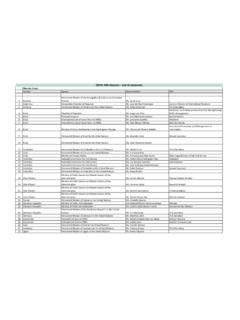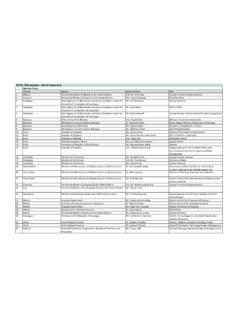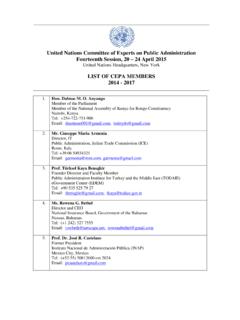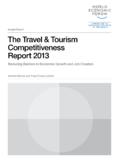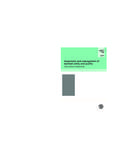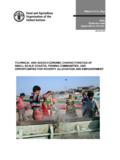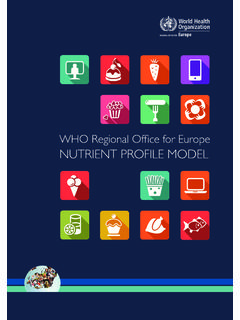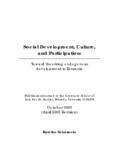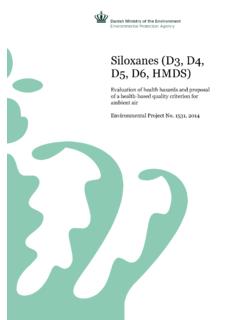Transcription of E-GOVERNMENT SURVEY 2016 - Sign In Page
1 Department of Economic and Social Affairs UNITED NATIONS. E-GOVERNMENT . SURVEY 2016 . E-GOVERNMENT IN SUPPORT OF. SUSTAINABLE DEVELOPMENT. UNITED NATIONS. New York, 2016 . United Nations Department of Economic and Social Affairs The Department of Economic and Social Affairs of the United Nations Secretariat is a vital interface between global policies in the economic, social and environmental spheres and national action. The Department works in three main interlinked areas: (i) it compiles, generates and analyses a wide range of economic, social and environmental data and information on which States Members of the United Nations draw to review common problems and to take stock of policy options; (ii) it facilitates the negotiations of Member States in many intergovernmental bodies on joint course of action to address ongoing or emerging global challenges; and (iii). it advises interested Governments on the ways and means of translating policy frameworks developed in United Nations conferences and summits into programmes at the country level and, through technical assistance, helps build national capacities.
2 Disclaimers The designations employed and the presentation of the material in this publication do not imply the expression of any opinion whatsoever on the part of the Secretariat of the United Nations concerning the legal status of any country, territory, city or area, or of its authorities, or concerning the delimitation of its frontiers or boundaries. The designations developed and developing economics are intended for statistical convenience and do not necessarily imply a judgment about the state reached by a particular country or area in the development process. The term country as used in the text of this publication also refers, as appropriate, to territories or areas. The term dollar normally refers to the United States dollar ($). The views expressed are those of the individual authors and do not imply any expression of opinion on the part of the United Nations. Copyright United Nations, 2016 . All rights reserved. No part of this publication may be reproduced, stored in retrieval system or transmitted, in any form or by any means, electronic, mechanical, photocopying, recording or otherwise, without prior permission.
3 ST/ESA/ Sales no.: ISBN: 978-92-1-123205-9. eISBN: 978-92-1-058156-1. Symbol: ST/ESA/ United Nations E-GOVERNMENT Surveys: 2016 E-GOVERNMENT for Sustainable Development 2014 E-GOVERNMENT for the Future We Want 2012 E-GOVERNMENT for the People 2010 Leveraging E-GOVERNMENT at a Time of Financial and Economic Crisis 2008 From E-GOVERNMENT to Connected Governance 2005 From E-GOVERNMENT to E-Inclusion 2004 Towards Access for Opportunity 2003 World Public Sector Report: E-GOVERNMENT at the Crossroads 2001 Benchmarking E-GOVERNMENT : A Global Perspective Website: Printed at the United Nations, New York ii E-GOVERNMENT IN SUPPORT OF SUSTAINABLE DEVELOPMENT. Foreword The year 2015 marked a milestone in efforts to eradicate poverty and promote prosperity for all people on a safe planet. With the adoption of the 2030 Agenda for Sustainable Development and other major international commitments, we embarked in an unprecedented endeavour to transform our world.
4 The 2030 Agenda is centred on a set of far-reaching and people- centred universal Sustainable Development Goals (SDGs). Reaching these goals in all countries and creating peaceful, just and inclusive societies will be extremely difficult in the absence of effective, accountable and inclusive institutions. Institutions need to be capable and equipped to adapt the Agenda to the national situation. They need to be able to mobilize the society and the private sector in implementing the SDGs. Capacities and innovation will be required to promote policy integration, enhance public accountability, promote participation for more inclusive societies as well as ensure equitable and effective public services for all, particularly for the poorest and most vulnerable groups. ICT and E-GOVERNMENT are important tools to realize these objectives. Against this backdrop, the 2016 United Nations E-GOVERNMENT SURVEY highlights a positive global trend towards higher levels of E-GOVERNMENT development.
5 Countries in all regions are increasingly embracing innovation and utilizing ICTs to deliver services and engage people in decision-making processes. One of the most important new trends is the advancement of people-driven services. It addresses the growing demand for more personalized services that reflect individual needs, as well as people's aspiration to be more closely engaged in the design and delivery of services. These new demands are transforming the way the public sector operates. At the same time, disparities remain within and among countries. Lack of access to technology, poverty and inequality prevent people from fully taking advantage of the potential of ICTs and E-GOVERNMENT for sustainable development. For ICTs to truly transform the public sector into an instrument of sustainable development, efficiency in service delivery must be also coupled with social equity and ensuring that all people can access quality services. Such efforts are vital to making sure that the sustainable development goals are at the centre of all government policies and of public management and that no one is left behind.
6 WU Hongbo Under-Secretary-General for Economic and Social Affairs United Nations Department of Economic and Social Affairs iii iv E-GOVERNMENT IN SUPPORT OF SUSTAINABLE DEVELOPMENT. Acknowledgements The 2016 United Nations E-GOVERNMENT SURVEY is the product of a collective effort by the United Nations Department of Economic and Social Affairs (DESA), Division for Public Administration and Development Management (DPADM) and by many external experts, researchers and contributors from other organizations. In particular, the following are acknowledged for their specific roles in its production. Preparation of the publication was undertaken by a group of senior E-GOVERNMENT researchers and advisers under the guidance of Juwang Zhu, former Director of DPADM. The report was reviewed and finalized under the overall guidance of Marion Barth lemy, Acting Director of DPADM. The Data Management Team was overseen by Vincenzo Aquaro, Chief of the E-GOVERNMENT Branch.
7 Adriana Alberti, Senior Governance and Public Administration Officer, managed the data collection and SURVEY research while Wai Min Kwok, Governance and Public Administration Officer, coordinated the data analysis and verification. The analytical work was coordinated by Adriana Alberti. Chapter 1 was prepared by Seok-Ran Kim, Governance and Public Administration Officer; Chapter 2 by Adriana Alberti; Chapter 3 by Adriana Alberti, Vyatcheslav Cherkasov, Senior Governance and Public Administration Officer, and Yuri Misnikov, an external consultant;. Chapter 4 by Elida Reci, Governance and Public Administration Officer, and Chapter 5 by Wai Min Kwok. Vincenzo Aquaro provided insightful comments to the chapters. The Annexes and the Methodology section were drafted by Wai Min Kwok supported by Elena Garuccio, an external consultant, with the assistance of Enkel Daljani, Programme Assistant. Special thanks go to Abigail Somma, an external consultant, who undertook the editorial revision of the SURVEY , and to Said Maalouf, Team Assistant, for his support in the final review.
8 Simen Gudevold, Associate Governance and Public Administration Officer, provided support in proofreading the publication. We are most grateful to the Publishing Services Section of the UN Office at Nairobi, especially to Henry Hunt and Jinita Shah, and colleagues from the Graphic Design Unit of DPI for their professionalism and collaboration. Xiao Wang from UNPAN Management Unit (UMU) provided the overall coordination of the design of this publication. Recognition also goes to renowned E-GOVERNMENT experts who reviewed selected chapters and provided comments, including Dr. Adegboyega Ojo, Senior Research Fellow and E-GOVERNMENT Unit Leader Insight Center for Data Analytics, National University of Ireland Galway, Republic of Ireland and Jeremy Millard, Senior Consultant, Danish Technological Institute, Denmark, who reviewed Chapter 1; Professor Dennis Anderson, Chairman, Department of Management and Information Technology, S. Francis College, United States of America, who reviewed Chapter 2.
9 Prof. Ann Macintosh, Emeritus Professor of Digital Governance, Institute of Communications Studies, University of Leeds, United Kingdom, who reviewed Chapter 3; and Julia Gliddens, General Manager, Global government Industry, IBM, United States, who reviewed Chapter 4. Rowena Bethel, Chief Executive Officer of the National Insurance Board, and United Nations Committee of Experts on Public Administration (CEPA) Member, Bahamas, reviewed Chapter 5. United Nations interns assisted in research and data verification, collecting case studies, and formatting the SURVEY , including Lea Duplan, Hayoung Eom, Burcu Polatbora, Stan Sorokin, and Haopeng Zhang. Ms. Madeleine Losch, Programme Assistant, DPADM, supported in compiling information and assisting the research team. In addition, Damla Kaya provided support in the final review process of the publication. Selected case studies were provided by DPADM's UN Project Office on Governance (UNPOG), including Keping Yao, Governance and Public Administration Officer, Hyun-Jung Kim and Chang Rok Yun.
10 The 2016 SURVEY benefited from the advice and guidance of a group of experts who took part in an Expert Group Meeting that DPADM organized in New York in March 2015 to review the SURVEY 's themes and methodology. The group consisted of Mr. Erwin Alampay, Director of the Center for Local and Regional Governance, University of the Philippines, Philippines;. Mr. Dennis Anderson; Ms. Johanna Awotwi, Director of the Research Center for e-Governance, Ghana; Ms. Rowena Bethel; Mr. Ibrahim Elbadawi, Co-founder and Managing Director of Exantium, Sudan; Ms. Julia Glidden; Mr. Driss Kettani, Professor of Computer Science, School of Science and Engineering Alakhawayn University, Morocco; Mr. Soung Hie Kim, Chairman of v ACKNOWLEDGEMENTS. Korea e-Governance Research Association, Republic of Korea; Ms. Bikesh Kumangaliyeva, First Vice Chairperson, Zerde - National ICT Holding, Kazakhstan; Ms. Magdalena AK Muir, Arctic Institute of North America & Coastal and Marine Union (EUCC); Ms.
